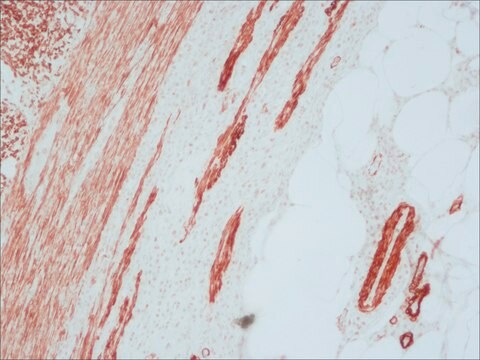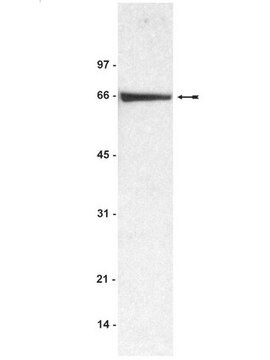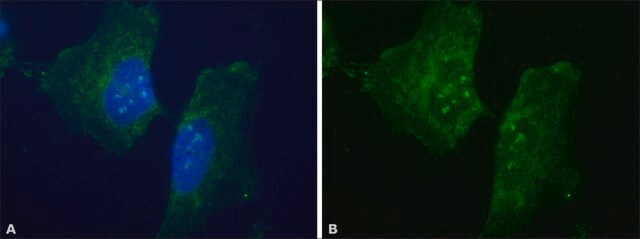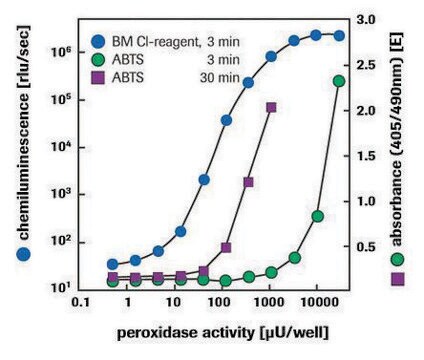07-419
Anti-SHP-1/SHPTP-1 Antibody
Upstate®, from rabbit
Synonim(y):
Anti-DRPLA
Zaloguj sięWyświetlanie cen organizacyjnych i kontraktowych
About This Item
Kod UNSPSC:
12352203
eCl@ss:
32160702
NACRES:
NA.41
Polecane produkty
pochodzenie biologiczne
rabbit
Poziom jakości
forma przeciwciała
purified immunoglobulin
rodzaj przeciwciała
primary antibodies
klon
polyclonal
reaktywność gatunkowa
human
producent / nazwa handlowa
Upstate®
metody
immunoprecipitation (IP): suitable
western blot: suitable
izotyp
IgG
numer dostępu NCBI
numer dostępu UniProt
Warunki transportu
wet ice
docelowa modyfikacja potranslacyjna
unmodified
Specyficzność
SHP1
Immunogen
Full-length glutathione transferase SHP-1 fusion protein, purified from bacteria
Zastosowanie
Research Category
Signaling
Signaling
Research Sub Category
Cytoskeletal Signaling
Cytoskeletal Signaling
This Anti-SHP-1/SHPTP-1 Antibody is validated for use in IP, WB for the detection of SHP-1/SHPTP-1.
Jakość
routinely evaluated by immunoblot in RIPA lysates from human A431 carcinoma cells
Opis wartości docelowych
65kDa
Postać fizyczna
0.1M Tris-glycine, pH 7.4, 0.15M NaCl, 0.05% sodium azide
Format: Purified
Protein A purified
Przechowywanie i stabilność
1 year at 2-8°C
Komentarz do analizy
Control
Positive Antigen Control: Catalog #12-301, non-stimulated A431 cell lysate. Add 2.5µL of 2-mercaptoethanol/100µL of lysate and boil for 5 minutes to reduce the preparation. Load 20µg of reduced lysate per lane for mingels.
Positive Antigen Control: Catalog #12-301, non-stimulated A431 cell lysate. Add 2.5µL of 2-mercaptoethanol/100µL of lysate and boil for 5 minutes to reduce the preparation. Load 20µg of reduced lysate per lane for mingels.
Informacje prawne
UPSTATE is a registered trademark of Merck KGaA, Darmstadt, Germany
Oświadczenie o zrzeczeniu się odpowiedzialności
Unless otherwise stated in our catalog or other company documentation accompanying the product(s), our products are intended for research use only and are not to be used for any other purpose, which includes but is not limited to, unauthorized commercial uses, in vitro diagnostic uses, ex vivo or in vivo therapeutic uses or any type of consumption or application to humans or animals.
Ta strona może zawierać tekst przetłumaczony maszynowo.
Nie możesz znaleźć właściwego produktu?
Wypróbuj nasz Narzędzie selektora produktów.
Kod klasy składowania
10 - Combustible liquids
Klasa zagrożenia wodnego (WGK)
WGK 1
Certyfikaty analizy (CoA)
Poszukaj Certyfikaty analizy (CoA), wpisując numer partii/serii produktów. Numery serii i partii można znaleźć na etykiecie produktu po słowach „seria” lub „partia”.
Masz już ten produkt?
Dokumenty związane z niedawno zakupionymi produktami zostały zamieszczone w Bibliotece dokumentów.
Erythropoietin induces sustained phosphorylation of STAT5 in primitive but not definitive erythrocytes generated from mouse embryonic stem cells.
Kazue Tsuji-Takayama, Takeshi Otani, Toshiya Inoue, Shuji Nakamura, Ryuichi Motoda et al.
Experimental Hematology null
J Yamamoto et al.
British journal of cancer, 110(9), 2232-2245 (2014-04-20)
Malignant pleural mesothelioma (MPM) is an aggressive neoplasm arising from mesothelial lining of pleura. CD26 molecules preferentially expressed on epithelioid type of MPM. This study investigates the molecular mechanisms of CD26 regulating MPM cells in vitro and in vivo. Biochemical
P Bruhns et al.
The Journal of biological chemistry, 275(48), 37357-37364 (2000-10-04)
FcgammaRIIB are single-chain low affinity receptors for IgG that negatively regulate immunoreceptor tyrosine-based activation motif-dependent cell activation. They bear one immunoreceptor tyrosine-based inhibition motif (ITIM) that becomes tyrosyl-phosphorylated upon coaggregation of FcgammaRIIB with immunoreceptor tyrosine-based activation motif-bearing receptors and that
Thierry Voisin et al.
FASEB journal : official publication of the Federation of American Societies for Experimental Biology, 22(6), 1993-2002 (2008-01-17)
Orexins acting at the G protein-coupled receptor (GPCR) OX1R have recently been shown to promote dramatic apoptosis in cancer cells. We report here that orexin-induced apoptosis is driven by an immunoreceptor tyrosine-based inhibitory motif (ITIM) (IIY(358)NFL) present in the OX1R.
N Rivard et al.
The Journal of biological chemistry, 270(18), 11017-11024 (1995-05-05)
PTP1C and PTP1D are non-transmembrane protein-tyrosine phosphatases (PTPs), which contain two src homology-2 domains. These enzymes are believed to play a role in regulating downstream signaling from receptors with intrinsic tyrosine kinase activity. The present study describes the tyrosine phosphorylation
Nasz zespół naukowców ma doświadczenie we wszystkich obszarach badań, w tym w naukach przyrodniczych, materiałoznawstwie, syntezie chemicznej, chromatografii, analityce i wielu innych dziedzinach.
Skontaktuj się z zespołem ds. pomocy technicznej





